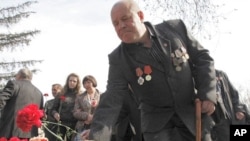Ukrainian President Viktor Yanukovych and Russian President Dmitry Medvedev on Tuesday marked the 25th anniversary of the world's worst nuclear disaster during a memorial service outside Chernobyl's nuclear reactor.
As Japan struggles with its own nuclear crisis at the tsunami-damaged Fukushima nuclear plant, Ukrainian President Viktor Yanukovych said no nation can overcome the consequences of such a catastrophe on its own.
Marking the first visit to Chernobyl by a Russian president, Medvedev called on the international community to work together toward unified nuclear safety guidelines to ensure that disasters like those at Chernobyl and Fukushima are not repeated.
His words echoed the remarks by United Nations Secretary General Ban Ki-moon. In a statement released Tuesday, Ban highlighted the need to strengthen global nuclear safety. He also praised the heroism of emergency workers who responded to the Chernobyl disaster and the plight of millions of people affected by the accident.
Earlier, Russian Orthodox Patriarch Kirill led a commemoration service in Kyiv. He struck a bell at the exact moment of the Chernobyl explosion on April 26, 1986. The bell tolled 25 times, once for each year since the accident.
The Chernobyl anniversary was also remembered by protesters in several European countries. Thousands took part in demonstrations across Germany on Monday.
The Chernobyl explosion released 400 times more radiation than the atomic bomb dropped on Hiroshima in 1945. It sent a cloud of radioactive fallout into Russia, Belarus and over a large portion of northern Europe.
The 1986 disaster has left a 30-kilometer area around the Chernobyl plant largely uninhabitable. Environmentalists any crops grown in the surrounding area could pose a threat to human health.
Thousands of sickened workers involved in the cleanup have protested in Kyiv against cuts in the benefits and compensation they receive for their exposure to radiation. They say their monthly pensions recently were cut, leaving them with barely enough money to pay for food and needed medication.
A donors conference in Kyiv last week raised more than $785 million, short of the $1.1 billion goal to build a new containment shell to replace the now-decaying original shell that was built over the damaged reactor.
The disaster fueled a global debate about the safety of nuclear energy as a power source, a debate that has renewed since last month's earthquake and tsunami damaged the Japanese plant.




